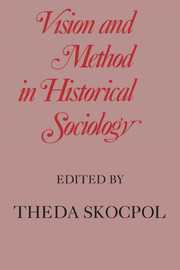Book contents
- Frontmatter
- Contents
- Preface
- 1 Sociology's Historical Imagination
- 2 The Social and Historical Landscape of Marc Bloch
- 3 Beyond the Economistic Fallacy: The Holistic Social Science of Karl Polanyi
- 4 Configurations in History: The Historical Sociology of S. N. Eisenstadt
- 5 Theoretical Generalization and Historical Particularity in the Comparative Sociology of Reinhard Bendix
- 6 Destined Pathways: The Historical Sociology of Perry Anderson
- 7 E. P. Thompson: Understanding the Process of History
- 8 Charles Tilly's Collective Action
- 9 The World System of Immanuel Wallerstein: Sociology and Politics as History
- 10 Discovering Facts and Values: The Historical Sociology of Barrington Moore
- 11 Emerging Agendas and Recurrent Strategies in Historical Sociology
- An Annotated Bibliography on Methods of Comparative and Historical Sociology
- Notes on the Contributors
4 - Configurations in History: The Historical Sociology of S. N. Eisenstadt
Published online by Cambridge University Press: 05 June 2012
- Frontmatter
- Contents
- Preface
- 1 Sociology's Historical Imagination
- 2 The Social and Historical Landscape of Marc Bloch
- 3 Beyond the Economistic Fallacy: The Holistic Social Science of Karl Polanyi
- 4 Configurations in History: The Historical Sociology of S. N. Eisenstadt
- 5 Theoretical Generalization and Historical Particularity in the Comparative Sociology of Reinhard Bendix
- 6 Destined Pathways: The Historical Sociology of Perry Anderson
- 7 E. P. Thompson: Understanding the Process of History
- 8 Charles Tilly's Collective Action
- 9 The World System of Immanuel Wallerstein: Sociology and Politics as History
- 10 Discovering Facts and Values: The Historical Sociology of Barrington Moore
- 11 Emerging Agendas and Recurrent Strategies in Historical Sociology
- An Annotated Bibliography on Methods of Comparative and Historical Sociology
- Notes on the Contributors
Summary
At the time of its publication in 1963, The Political Systems of Empires seemed almost the sole occupant of that area we now recognize, without literary grace, as macrocomparative historical sociology. To be sure, Reinhard Bendix's Work and Authority in Industry came earlier and certainly had historical and comparative dimensions. At that time, however, it appeared more as a contribution to “the sociology of knowledge and the sociology of work relations” than as a comparative analysis of historical change. Also present was Wittfogel's influential and much criticized book, Oriental Despotism, and Coulborn's more appreciated and more limited edition, Feudalism in History. Although both were comparative and historical, neither resonated with the historical vision nor possessed the comparative breadth of Political Systems. E. P. Thompson's The Making of the English Working Class also appeared in 1963, but did not draw sociologists to it until several years later; even then it was (and continues to be) viewed as a historical instead of a sociological analysis – a mistake that could not be made about Political Systems. In 1963, Bendix's Nation-building and Citizenship and Tilly's The Vendeé lay one year in the future; Moore's Social Origins of Dictatorship and Democracy and Parsons's Societies: Comparative and Evolutionary Perspectives three years in the future; Wallerstein's The Modern World-System and Anderson's Passages from Antiquity to Feudalism eleven years in the future.
- Type
- Chapter
- Information
- Vision and Method in Historical Sociology , pp. 85 - 128Publisher: Cambridge University PressPrint publication year: 1984
- 10
- Cited by



